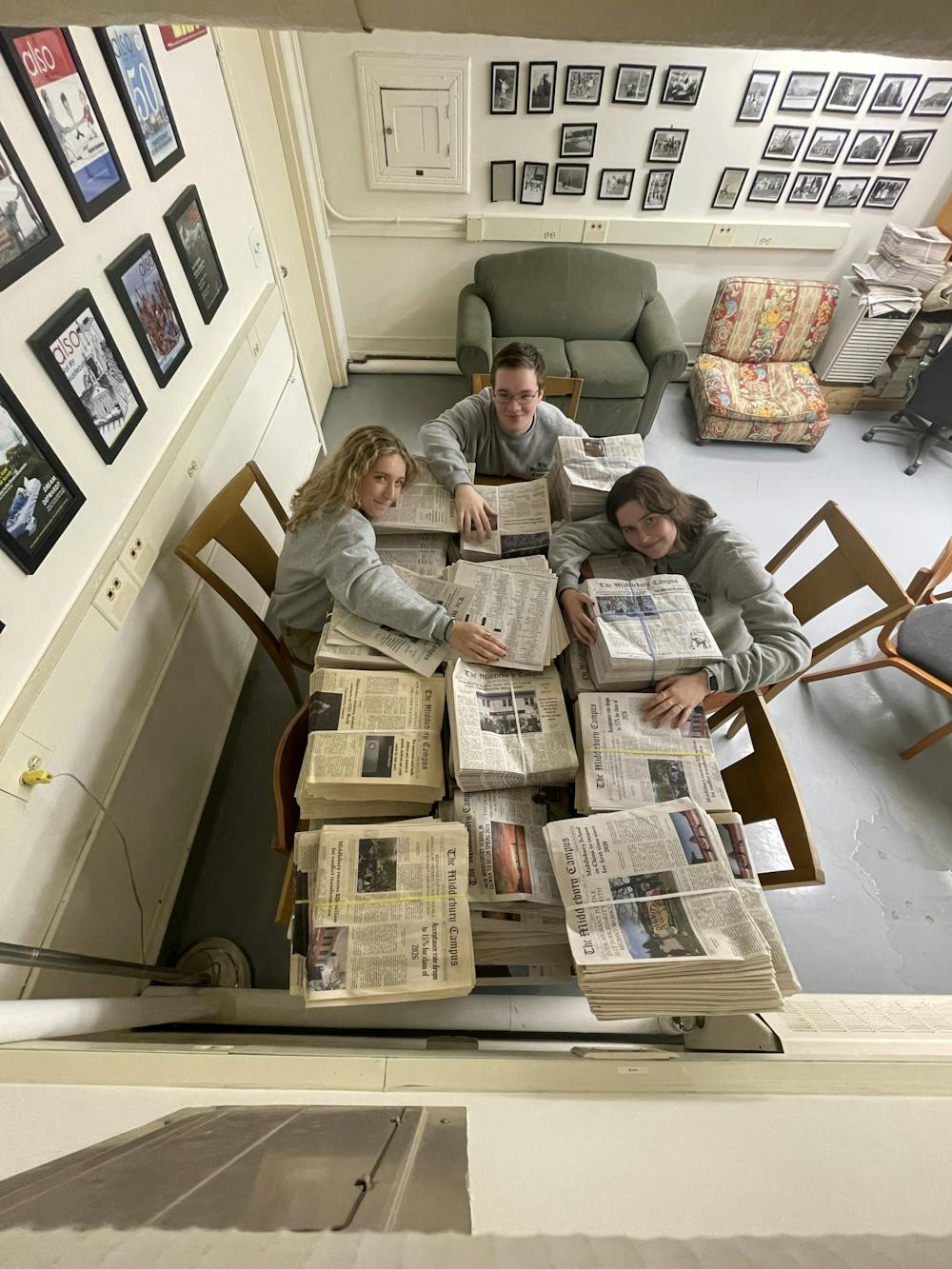“Maggie Reynolds, editor in chief, history major. Katie Futterman, managing editor, history major. Ryan McElroy, managing editor, history major.”
As the executive team of The Campus, we go to a lot of meetings. Our shared major never fails to get a surprised reaction from administrators.
Even our professors are abuzz with the news — we’ve heard from some anonymous sources that our common academic interest has come up as a point of pride in history department faculty meetings. Some faculty even seem to slyly reference The Middlebury Campus in their lectures, trading knowing glances and nodding to us as we sit in class in our branded sweatshirts.
We too were surprised to discover in our initial icebreakers that all three of us on this year’s executive team were history majors. We did not plan it this way, nor was it a core requirement in the job description. But after reflecting on this odd similarity in our backgrounds, we have decided that this was not just a coincidence or quirk: the history major is uniquely suited to our role as student journalists.
Since all three of us have been asked more times than we can count why we are not English majors, or how we’re enjoying the (nonexistent) journalism program at Middlebury, we are here to make a case for the history major as it relates to journalism. Studying history allows us to develop the reading and nonfiction writing skills pertinent to journalism, as well as dive into a wide range of subjects for the short length of a semester, much like how journalists dive into various topics while writing stories.
While the history major of course has some requirements — a pre-1800 course, courses in three of the seven regions of the world, among others — students in the department are largely able to pick classes based on the different topics that interest them.
Between the three of us, we have taken courses on historical subjects as varied as “Oil, Opium and Oligarchs,” “The Soviet Experiment” and “Christians in the Modern Middle East.” We are not experts in any one historical area or time period, but our experience learning about different topics and points in history prepares us well for the daily job of a journalist.
Being a reporter requires us to become experts on new topics on a monthly, weekly or even daily basis in order to turn around a thoroughly researched news story. We have spent semesters attempting to become experts on the history of Pakistan or Vermont enlistment in the Civil War, which translates well to mastering specific topics quickly to report on them.
Many 100 and 200 level history courses focus on teaching students to effectively read primary and secondary sources, from which they are tasked with constructing a comprehensive historical narrative. We learn to ask the questions, “what was this author’s purpose in writing this source?,” “who was the intended audience for this source?” and “what information might be missing from this source?”
Piecing together an accurate representation of history from various sources is similar to a journalist’s task of determining the facts and angle of a story from the interviews they have conducted. Journalists must keep in mind sources’ potential biases and construct a fair narrative from different perspectives in the same way that we develop the skills of critically analyzing existing sources in history courses.
While English or political science students spend considerable time reading theory and evaluating ideas that some may say lack any basis in reality, the history major is more focused on researching and interpreting facts. We are drawn to the chance history classes give us to read varied sources — ranging from letters and newspaper archives to books and scholarly articles — and develop our own understandings of the information we read.
Even if they do not choose to write a senior thesis, history majors at Middlebury must complete HIST 600: the junior thesis. By producing a 20 to 25 page research report, this historical research seminar forces history students to choose an original topic of inquiry and get into the records of primary source research. From conducting oral history interviews to digging into Vermont newspaper archives from the 1960s and 70s, the HIST 600 project taught us to be self-directed and produce original research in the same way that journalists aim to with each news story they write.
Through our years spent on The Campus and our semesters studying history at Middlebury, we have seen that history makes us better journalists, and journalism makes us better history students. The two disciplines together allow us to be sharp readers, effective verbal communicators and efficient writers.
Thanks to the knowledge we have gained from the Middlebury history department and our experiences as student-journalists, we know how to pick out the biases in a source, put together an accurate representation of what happened in an event and produce rigorously researched, unbiased writing.
We do not necessarily intend for this to read as unjustified propaganda for the history department; rather, we hope to present this op-ed as a fact-based, peer-reviewed, historiographically-minded, originally researched scholarly work — rigorously cited in line with 9th edition Turabian, of course — to argue that history is the best major.

Katie Futterman '24 (she/her) is a Managing Editor.
Katie previously served as a News Editor and Staff Writer. This past summer, she was a news intern at Seven Days, and she held the same position at the Addison Independent the prior summer. In her free time, she loves to read, write, and bask in the sun.

Maggie Reynolds '24 (she/her) is the Editor in Chief.
Maggie previously served as the Senior Local Editor, a Local Section Editor, and a Staff Writer. She spent this past J-term interning for VTDigger, covering topics from affordable housing in Addison County to town government scandals. She also interned for Seven Days VT as an arts & culture reporter summer 2022 and as a news reporter for the Daily Gazette in Schenectady, NY summer 2021.
Maggie is majoring in History and minoring in Political Science and Spanish. She was a three-year member of the Women's Swimming and Diving team. Maggie enjoys running, hiking, and iced maple lattes.

Ryan McElroy '25 (he/him) is the Editor in Chief.
Ryan has previously served as a Managing Editor, News Editor and Staff Writer. He is majoring in history with a minor in art history. Outside of The Campus, he is co-captain of Middlebury Mock Trial and previously worked as Head Advising Fellow for Matriculate and a research assistant in the History department. Last summer Ryan interned as a global risk analyst at a bank in Charlotte, North Carolina.


